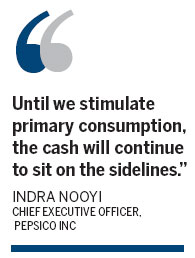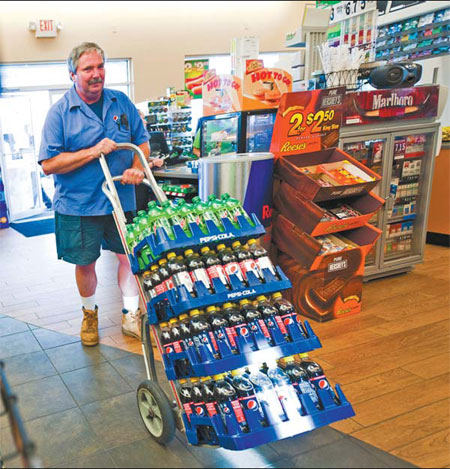Firms brace for weak demand
|
A PepsiCo Inc employee delivers beverages to a store in Stratford, Connecticut. US consumer spending in the second quarter showed the smallest gain since the same period in 2009. Paul Taggart / Bloomberg |

SAN FRANCISCO - From soft-drink producers to theme- park companies and automakers, corporations worldwide are seeing weak consumer demand.
PepsiCo Inc's chief executive officer said companies need more demand for their products before they will start using cash to expand. Walt Disney Co shares fell on Thursday on concern that lower consumer confidence may hurt its businesses, and Honda Motor Co said the possibility of delayed car purchases might lead to a revised forecast.
"You've got to stimulate demand growth," said Indra Nooyi, chief executive officer of PepsiCo, in an interview. "Until we stimulate primary consumption, the cash will continue to sit on the sidelines."
The companies' warnings follow a cut to the US credit rating on Aug 5 and a two-week rout in global equity markets as investors dumped stocks in favor of gold and US Treasuries. With three European countries having required bailouts, concern over weakening demand and rising unemployment is spreading. A report on Wednesday said confidence among small businesses fell in July for the fifth consecutive month as the sales outlook dimmed.
For Honda, Japan's third-largest automaker, and General Motors Co (GM), the biggest in the US, the turmoil may be hurting their results. Honda said on Wednesday that a prolonged drop in US stocks will lead to a decline in consumption, and GM said its forecast for 2011 US vehicle sales may be in jeopardy.
"Consumer confidence is pretty fragile right now," Don Johnson, GM's vice-president of US sales, said in a presentation. "With the recent volatility in the stock market, we know that's a concern we really have to watch closely."
Disney plunged 9.1 percent, the most since December 2008, in Thursday's New York Stock Exchange trading. Wunderlich Securities cut Disney's rating to "hold" from "buy" following the theme-park and media company's earnings report. TV station advertising sales are down by a mid-single digit percentage this quarter, Disney said on Wednesday on a conference call after the market closed.
US consumer spending from April through June showed the smallest gain since the second quarter of 2009, when the economy was in recession, according to a Commerce Department report on July 29. That contributed to second-quarter economic growth that trailed analysts' estimates, as gross domestic product rose at a 1.3 percent annual rate in the period.
The scarcity of jobs is contributing to the crisis. While unemployment in the US has been above 9 percent for the past four months, Spain's rate is more than double that at 20.9 percent. That presented a big enough challenge before the US downgrade, said Millan Alvarez-Miranda, chief executive officer of Unipapel SA, Spain's largest maker and distributor of paper products.
"We were all worried about the so-called double-dip recession but thought Europe and the US would be able to avoid it," Alvarez-Miranda said in an interview. "Right now, no one knows what's going to happen next."
Not all corporate executives are so concerned. Some say the market drop presents a buying opportunity and are taking the opportunity to repurchase shares. Fluor Corp, the largest publicly traded US construction company, and Japan's Softbank Corp told investors they're buying back stock.
The CEO of Constellation Brands Inc, the world's second-largest wine seller after E&J Gallo Winery, said his customers tend to keep buying wine in a slump.
"We're very well-positioned for any kind of short-term economic blip," CEO Rob Sands said in an interview. Victor, New York-based Constellation's brands include Ravenswood and Robert Mondavi.
Companies that sell to businesses are also more optimistic than those that rely on consumers. Santa Clara, California-based Intel Corp, which sells chips used in data centers in addition to personal computers, is benefiting as customers upgrade their infrastructure, Chief Financial Officer Stacy Smith said.
Executives said they are seeking a resolution that will restore consumer demand and inspire businesses to spend, even as the US government adjusts to the loss of its top-level rating.
As a result of the downgrade, "we could see interest rates going up, we could see higher cost of borrowing for businesses, which are all bad for economic growth and employment," Nooyi said. "So, we have to address it."
Bloomberg News
(China Daily 08/12/2011 page18)















